Internal Family Systems and Me
Feb 27 2024
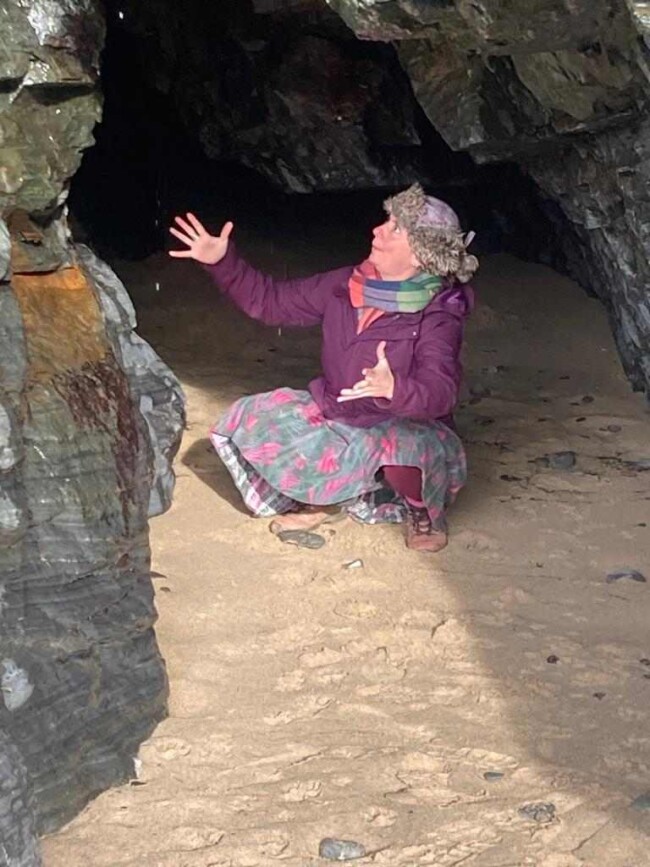
What is Internal Family Systems (IFS)?
IFS is a therapeutic system which is based on the theory that we are all made up of many parts (ie feelings, sensations, thoughts, memories, dreams, fantasies, etc…). You may already have a sense of this in yourself; in conversation we often say, “Part of me thinks this and part of me thinks that.“ Our parts don’t necessarily all get along, they can have very different wants, needs, values and desires.
In an IFS session, people are guided by a trained professional to investigate their inner parts; to find out where the parts live in or around their body, to discover what the parts are like, what roles they play in the system, how they feel about their roles and how the parts feel about each other. Through this exploration, people can develop a more compassionate relationship with their inner voices, which in turn can enable parts to let go of their burdensome roles, freeing up bound-up energy in the system.
My history of parts work
Parts work is nothing new to me. I first discovered the language of parts through Franki Anderson’s world of The Fool, over two decades ago. Franki teaches a form of solo improvisation known as Fooling, where the performer walks onto an empty stage and embodies their various parts or “masks” as she calls them. The term “mask” gave me a sense of lightness around my mental health for the first time in my life. I realised that I wear a huge range of social masks, depending on where I am and who I’m with. I also learned to see my depression and my Inner Critic as masks that I can play with, putting them on and taking them off at will. Up until then, I had the notion that I was possessed and there was nothing I could do about it.
Franki’s work was the beginning of my recovery from years of mental ill health. Her work took root in me and led me to study Dramatherapy, where I met Carl Jung’s Archetypes, Robert Landy’s Role Theory and Hal and Nidra Stone’s Voice Dialogue - all systems that explore the divided self in different ways. I wove all this theory into my clinical practice and developed a whole body of work, including Clown-o-therapy, The Inner Critic Inquiry and my extensive range of Fools courses and retreats.
What drew me to study IFS?
IFS has been popping up in my awareness for the last few years. To be honest I’ve felt a bit unsure about it, it seemed a bit too clean and shiny for my parts’ liking (I have quite a few parts that are attached to me being an outsider). But enough people who I respect had told me about it, so during the pandemic, I decided to attend the introduction to IFS training online.
I found IFS to be a neat system, with it’s simple categorisation of parts: Managers who try to pre-empt trouble, Firefighters who spontaneously emerge to douse trouble’s flames and Exiles who have been sent to deep underground cellars to avoid more trouble. I appreciated the step-by-step approach of how to converse with parts and found the notion of ‘Self’ or 'Self energy’ to be quite intriguing.
What is ‘Self’ or ‘Self energy’?
IFS believes that as well as each person having many parts, they also have a Self that is not a part. The Self is you at your most clear, calm, confident, connected, curious, compassionate, courageous and creative (these are known as the 8 C’s).
One of the aims with IFS is to help you to access more Self energy through ‘unblending’ with your parts. ‘Unblending’ means to separate your parts from your Self, so that you can see them more clearly. Like with Franki’s mask play, the distance can paradoxically bring more compassion and understanding to why your parts do what they do.
IFS and meditation
In summer 2022, I took a sabbatical and lived at a retreat centre for a year, and who’d’ve thought it, my parts all came with me! I sat on my meditation cushion with Burnout and Grief and found myself naturally turning towards parts work as a way to inquire deeply and compassionately into the nature of these parts. I read ‘No Bad Parts,’ by Mr Clean and Shiny IFS himself, Richard Swartz and began to integrate IFS exercises into my meditation, journalling and land art rituals, with astonishing results.
Towards the end of my time at the retreat centre, while I was trying to figure out how to integrate more meditation and IFS into my work, my eye was drawn to the IFS Level 1 training. The lead trainer was psychologist, Paul Ginter, who also happens to be a mindfulness teacher. Well now, if that wasn’t a sign, I don’t know what was! So I applied and got in first time!
How have I been integrating my IFS training into my practice?
In August, whilst staying at my dad and step-mum’s in France, I followed an urge to embody some of the IFS exercises I had been reading about in preparation for the training. Instead of just sitting and imagining conversations with my parts, I took them deep into the woods to find out more about them by giving them my body and voice, much to the entertainment of the birds, butterflies and wild boar.
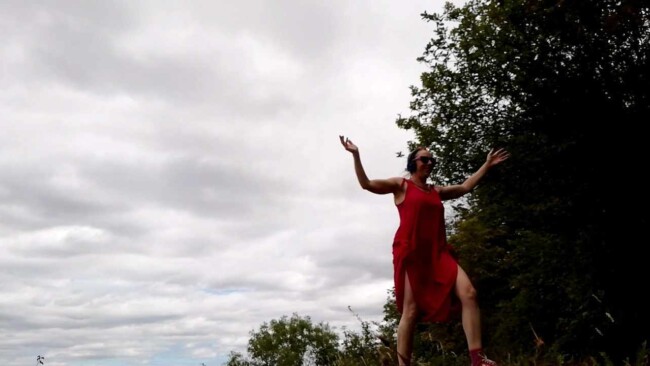
In September, I spent a whole week embodying my parts during a Fooling intensive in Cornwall, with a group of Euro-fools, under the guidance of Franki Anderson, exploring where Fooling and mythology meets Compassionate Inquiry (the work of Gabor Mate). Having a foundation in IFS gave me a new lens through which to view my parts and the parts of others, which helped me to stay with the process, even when parts of me wanted to run away.
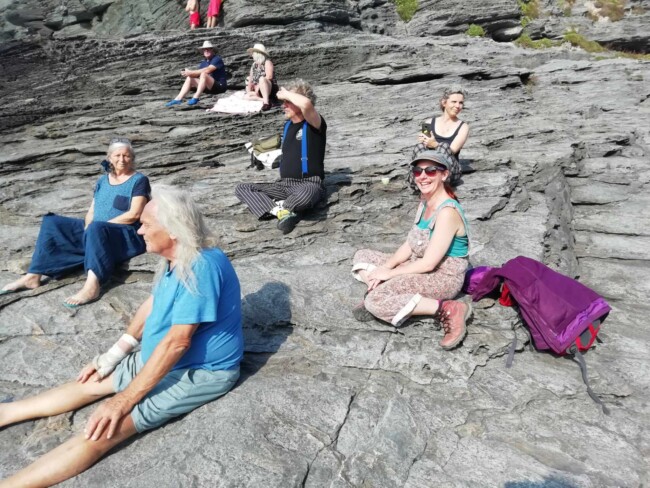
In October I embodied my parts on stage, spontaneously Fooling for my IFS course-mates, as part of our end of course party. Throughout the course I had become a bastion for the body; as a kinaesthetic learner and a body-based practitioner, I had found all the sitting and listening very hard, so for my solo I performed a celebration of the human body with song and dance, thus creating an intention to keep exploring ways to bring IFS into the body.
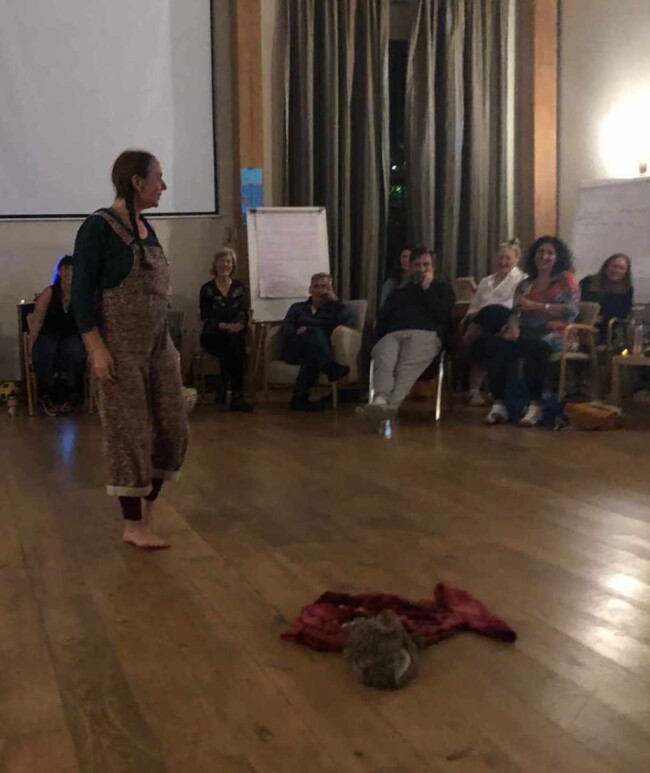
In November I had a studio day with fellow Beyond The Ridiculous Fools Chez Dunford and Dominique Fester, where we explored ways that Fooling and IFS can smash together. We noticed and embodied some of our present parts, then picked up our pens and wrote as them, before dropping into the empty space and Fooling with what remained. The results were very rich; knowing more about our parts before improvising with them gave us a full technicolour pallet to work with.
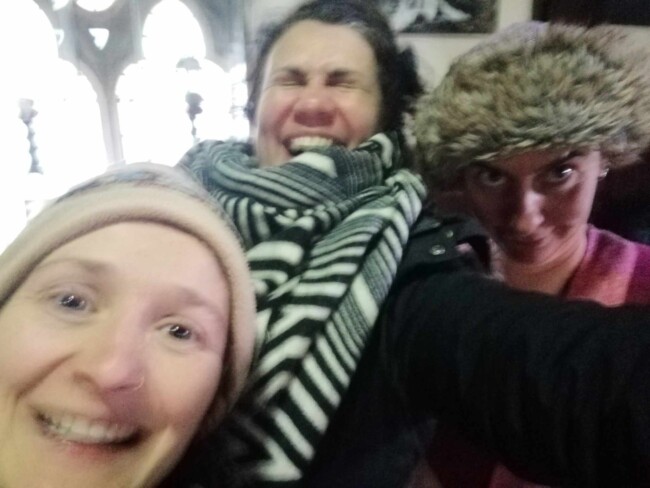
In December, I had an IFS/fool exploration day with IFS therapist + Fool, Sarah Burns. We tuned into our parts via a recorded guided meditation, before embodying what we found in an experimental, fluid fashion. Sarah then led me into the realms of visual art to capture our parts on the page - not my realm, but fascinating to explore in this way. We then zoned in on a few key parts, taking it in turns to embody them and be interviewed by each other using the IFS framework. Sensing the parts in the body, before embodying them and then drawing them, allowed us to easily access their wisdom when they came to being interviewed.
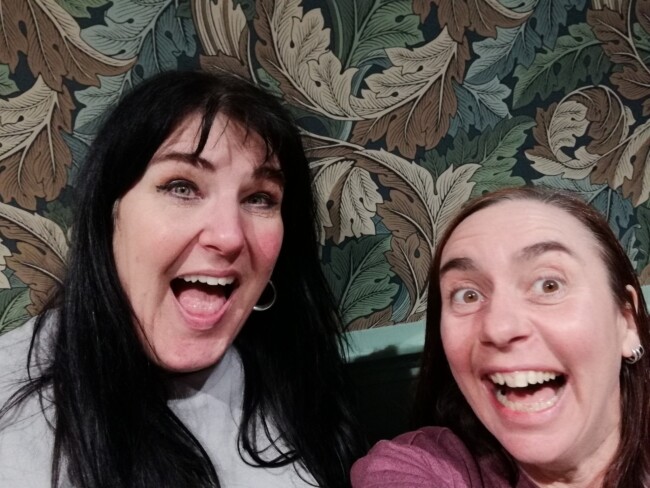
IFS has made it into most of my courses since coming back to work. It turned up in my Creative Clarity weekend workshop, formed the backbone of my online 4-week Creative Clarity series and has woven in and out of most of my online one-to-ones. It’s given participants a language to be able to meet themselves and their blocks in a different way, with curiosity and compassion instead of frustration and impatience.

What Next?
I’m excited to keep exploring ways to integrate IFS into my toolkit of dramatherapy, fooling, meditation, play, body-based inquiry, vocal expression and creative self-exploration.
I’m delighted to get a play day with the IFS/Fool/Clown mash-up group in March. There are four of us, all IFS trained clowns and fools who have been meeting online for a couple of years. This will be our first in-person play day! (Edit, you can read all about how that went here.)
Then in April there’s the Fool + IFS 5-day research lab, which I will co-facilitate with Saskia Solomons. You can find out more about that here.
Then who knows?
Sign up to my mailing list at the bottom of this page to be amongst the first to hear about my IFS adventures!



